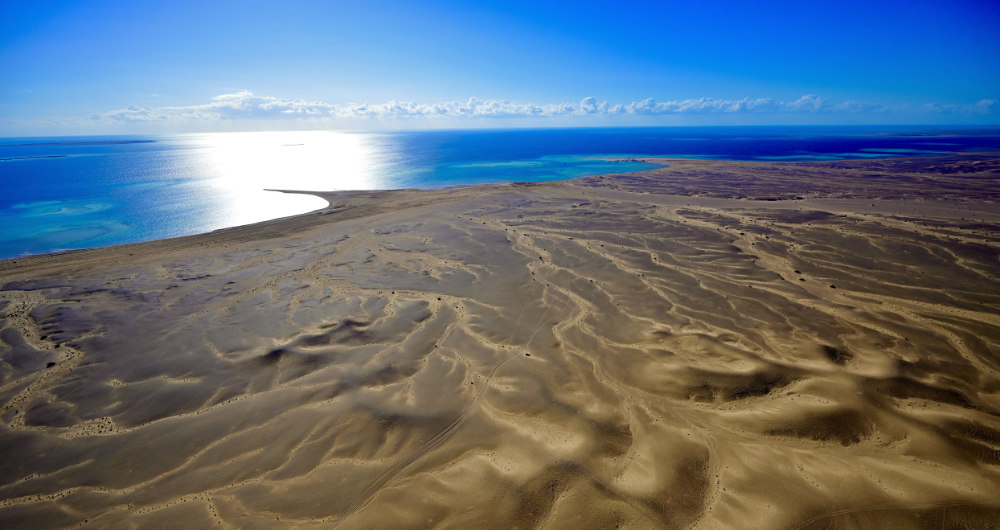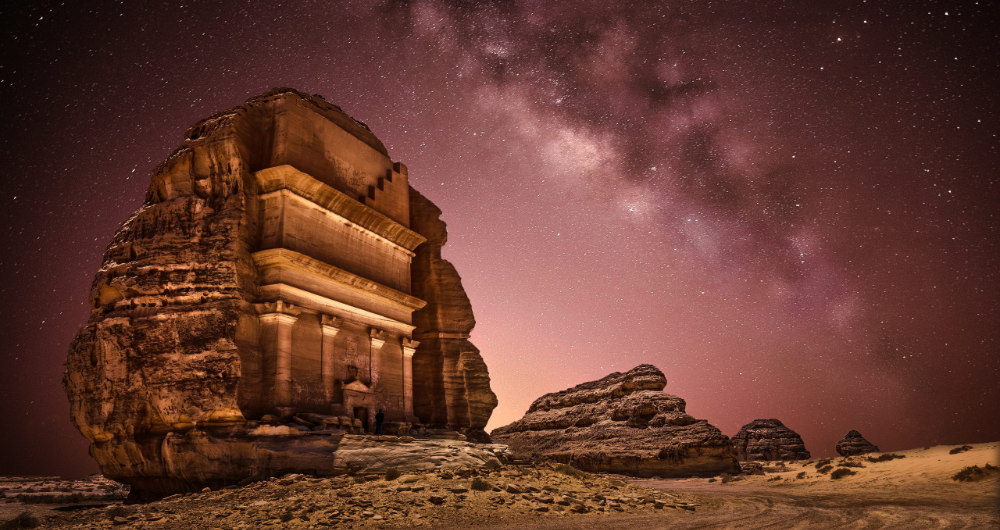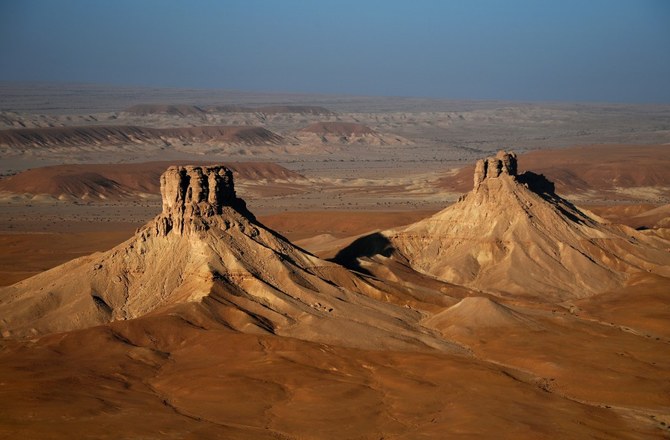DUBAI: Saudi Arabia is on track to meet its ambitious target of attracting 100 million visits to the Kingdom by 2030, Ahmed Al-Khateeb, the Kingdom’s Minister for Tourism, told Arab News.
“Our target is indeed ambitious,” he said. “However, we have everything we need to achieve our target.”
Some analysts have questioned whether the 100 million target might be too challenging to achieve, especially set against the numbers of tourists that visit countries with many decades of investment in the tourism industry, like France and the UAE, which respectively had 96 million and 16 million last year.
But Al-Khateeb — appointed minister last year — is confident that the Kingdom’s unexplored attractions will be an irresistible lure for global tourists in search of new experiences.
“We have a large country, diverse nature, a strong culture and great people, and therefore we have everything to get to the target we announced. I don't know any reason why not,” he insisted.
The minister was appearing on Frankly Speaking, the new series of televised interviews in which leading playmakers, in the Kingdom and beyond, are questioned on the big issues of the day.

The drive to develop the Saudi tourism industry is one of the main pillars of the Vision 2030 strategy to diversify the economy. (Supplied)
He backed up his confidence with some hard facts. Saudi Arabia had 40 million visits of all kinds in 2019, according to statistics from the UN World Tourism Organization, compared with around 1.5 billion tourists globally in 2019, leaving a big potential market for Saudi Arabia to aim at.
Large number of those travelers — around 600 million, Al-Khateeb estimated — wanted “sun, sea and sand” holidays, and he said Saudi Arabia was well placed to offer those attractions. “We are building amazing destinations at the Red Sea, all the way from NEOM to Amaala and Jeddah Downtown, therefore we will enrich the sun and sea offering and we will compete (in that segment),” he said.
But there seems to be no plans to offer alcoholic refreshments to those holiday-makers. Some industry analysts regard alcohol as an essential part of the global tourism package, but Al-Khateeb said that his own market research did not necessarily back this up.
“From the research we have conducted in more than 25 countries — and we took a very big sample — 40 to 50 percent of travelers say they would travel to our destinations that are not offering alcohol. Therefore, we have a lot to offer other than alcohol, and there is a lot to improve in hospitality, culture, food or luxury. You name it, we will be competing on other things,” he said.
More relaxed standards of dress would be allowed on private beaches and resorts — as is currently the practice in the Kingdom. But here are no current plans to change the dress code on public beaches in Saudi Arabia, he added.
The drive to develop the Saudi tourism industry is one of the main pillars of the Vision 2030 strategy to diversify the economy. The Kingdom has been progressively relaxing the strict travel and visa requirements of previous years, and is looking to promote it as a tourist destination across all sectors of the travel market.
The ministry’s market research also revealed a big potential market for affluent travelers seeking to explore culture, heritage and history in Saudi Arabia. “Some 30 percent of the 1.5 billion travelled for history and heritage and we have 10,000 discovered historical sites in Saudi Arabia, and five UNESCO listed sites,” Al-Khateeb said.
“Therefore, we will definitely enrich the history and heritage offering globally. People are anxious to come and experience and learn about civilizations past in this region thousands of years ago,” he said.
High-end elite tourism is one of the fastest growing segments of the international travel business, and Saudi Arabia hopes to capitalize on this trend, bringing big-spending affluent travelers to sites like AlUlla and other historical locations on the Red Sea. “We see a gap in this luxury offering,” Al-Khateeb said.

Saudi Arabia had 40 million visits of all kinds in 2019. (Supplied/Royal Commission for Al-Ula)
But he is also conscious of the financial attractions of the middle segment of the tourism market, seeking beach or adventure holidays. “Today we have major offerings in 2-, 3- and 4-star accommodation, as well as food and beverage and retail. When it comes to these activities, like sport and the adventure, we are improving our offering at the high end and we are building destinations that will also satisfy the middle segment,” he said.
“Whether at the mountains or the cities or the sea it is the same thing. We have many projects today that are catering for the middle class.”
After careers in banking and government service, Al-Khateeb became tourism minister with a mandate to propel the industry towards new highs, and launched new seasons of visitor attractions late last year, alongside a fast-track visa application process for many countries in the world. But he was almost immediately faced with the huge challenge of the global coronavirus pandemic, which has hit global tourism harder than perhaps any other area of economic activity.
He sees some silver lining in the pandemic, and the government response to it.
“We focused on domestic tourism, so we launched the summer campaign this year and it was a great success. The campaign was supervised by the health committee, and they ensured social distancing and people wearing masks. The result was that more than 8 million people travelled around the 10 destinations that we launched in the summer, and more than $3bn dollars were spent domestically,” he said.
Saudis have traditionally been big spenders on their foreign travels, effectively exporting $22 billion of tourism spend in 2019. Al-Khateeb hopes that some of that cash can be kept in the Kingdom in the future as domestic attractions open up. “We have reduced the leakage. In 2019 we launched 11 ‘seasons’ in Saudi Arabia and reduced the travel outside by 30 percent. When we continue to do this, we will definitely reduce the leakage — Saudis will like to stay at home and they will enjoy the offering,” he said.

Landscape shot between Wadi Al Dawasir and Haradh in Saudi Arabia. (AFP/File photo)
Luring visitors from the wider Gulf region is also a priority. But the big plans for the Saudi tourism industry will require big investment, and a large proportion of it is expected from outside investors who can be persuaded that the Kingdom is a viable destination - for global tourists as much as for their investment dollars. As a former banker, Al-Khateeb understands very well the challenges involved.
“We need to inject about $70 billion until 2023, and more than $200 billion by 2030 to fill the gap in the offering, whether in retail or in hospitality or in recreation,” he said. “Therefore, we have been sharing our story with the world. They (international investors in leisure) came and looked at our amazing natural resources, our heritage and history and culture, and they definitely see that there is an amazing opportunity,” he said.
“We are very optimistic about attracting investors from outside Saudi Arabia to come and join our very rewarding journey.”
Foreign investment in all sectors is up 12 per cent so far this year, even with the challenges of the pandemic. There is no doubting the challenges involved in “selling” Saudi tourism to a sometimes skeptical world that often fails to see the Kingdom’s attractions while it is focusing instead on negative stereotypes. But Al-Khateeb thinks that, as more and more people visit the country and experience its unique attractions, that global mindset will gradually change.
“Saudi Arabia is going through a major transformation, and we welcome and invite people to come and experience Saudi Arabia and see the changes that happened in the last few years,” he said. “We have achieved a lot so far and the best thing to do is to come and experience life here and see the changes on the ground.”
Twitter: @frankanedubai




























